Unit 18 Research Project: Hospitality Sector & Crisis Management
VerifiedAdded on 2023/06/09
|11
|2899
|64
Project
AI Summary
This research proposal, prepared for a Higher National Diploma in Hospitality Management, investigates the crucial role of organizational culture in the hospitality sector's response to COVID-19 and subsequent crisis management. The study aims to ascertain how organizational culture influences the handling of the pandemic and associated crises, focusing on a case study of Holiday Inn. The research objectives include identifying the role of organizational culture in managing the COVID-19 situation, assessing current practices for crisis management, investigating the relationship between organizational culture, COVID-19, and crisis management, and recommending effective strategies. The proposal outlines a qualitative research approach using an inductive approach and interpretivism philosophy. Primary data will be collected from Holiday Inn employees using probability sampling with a sample size of 20, and thematic analysis will be employed. The study's rationale highlights the significant impact of COVID-19 on the hospitality sector and the potential of organizational culture in mitigating its effects. The literature review explores the role of organizational culture in managing COVID-19, current crisis management practices, and the relationships among organizational culture, COVID-19, and crisis management. Ethical considerations, including informed consent and confidentiality, are also addressed. The proposal concludes with a breakdown of activities, a timeline, and a list of references.
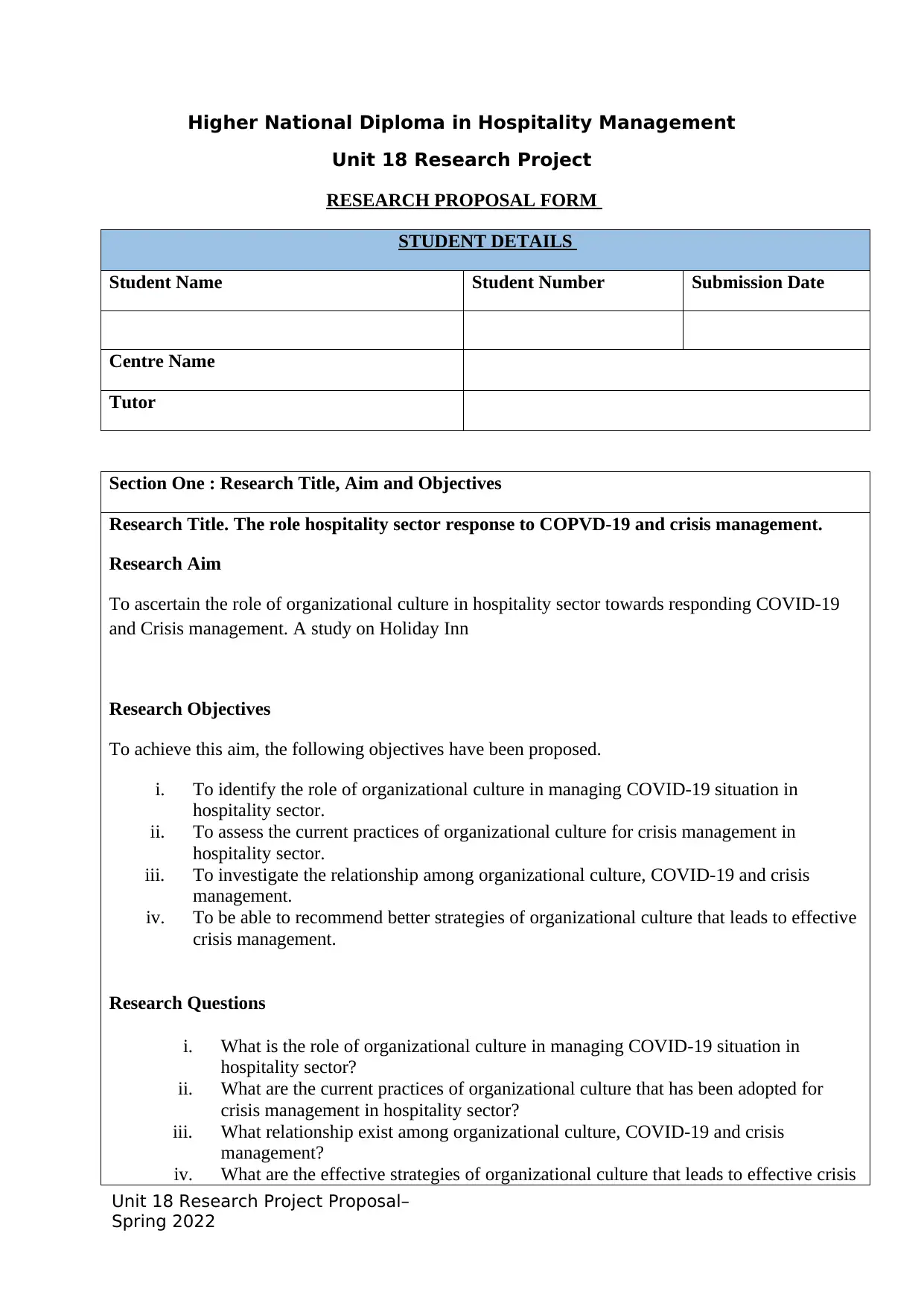
Higher National Diploma in Hospitality Management
Unit 18 Research Project
RESEARCH PROPOSAL FORM
STUDENT DETAILS
Student Name Student Number Submission Date
Centre Name
Tutor
Section One : Research Title, Aim and Objectives
Research Title. The role hospitality sector response to COPVD-19 and crisis management.
Research Aim
To ascertain the role of organizational culture in hospitality sector towards responding COVID-19
and Crisis management. A study on Holiday Inn
Research Objectives
To achieve this aim, the following objectives have been proposed.
i. To identify the role of organizational culture in managing COVID-19 situation in
hospitality sector.
ii. To assess the current practices of organizational culture for crisis management in
hospitality sector.
iii. To investigate the relationship among organizational culture, COVID-19 and crisis
management.
iv. To be able to recommend better strategies of organizational culture that leads to effective
crisis management.
Research Questions
i. What is the role of organizational culture in managing COVID-19 situation in
hospitality sector?
ii. What are the current practices of organizational culture that has been adopted for
crisis management in hospitality sector?
iii. What relationship exist among organizational culture, COVID-19 and crisis
management?
iv. What are the effective strategies of organizational culture that leads to effective crisis
Unit 18 Research Project Proposal–
Spring 2022
Unit 18 Research Project
RESEARCH PROPOSAL FORM
STUDENT DETAILS
Student Name Student Number Submission Date
Centre Name
Tutor
Section One : Research Title, Aim and Objectives
Research Title. The role hospitality sector response to COPVD-19 and crisis management.
Research Aim
To ascertain the role of organizational culture in hospitality sector towards responding COVID-19
and Crisis management. A study on Holiday Inn
Research Objectives
To achieve this aim, the following objectives have been proposed.
i. To identify the role of organizational culture in managing COVID-19 situation in
hospitality sector.
ii. To assess the current practices of organizational culture for crisis management in
hospitality sector.
iii. To investigate the relationship among organizational culture, COVID-19 and crisis
management.
iv. To be able to recommend better strategies of organizational culture that leads to effective
crisis management.
Research Questions
i. What is the role of organizational culture in managing COVID-19 situation in
hospitality sector?
ii. What are the current practices of organizational culture that has been adopted for
crisis management in hospitality sector?
iii. What relationship exist among organizational culture, COVID-19 and crisis
management?
iv. What are the effective strategies of organizational culture that leads to effective crisis
Unit 18 Research Project Proposal–
Spring 2022
Paraphrase This Document
Need a fresh take? Get an instant paraphrase of this document with our AI Paraphraser
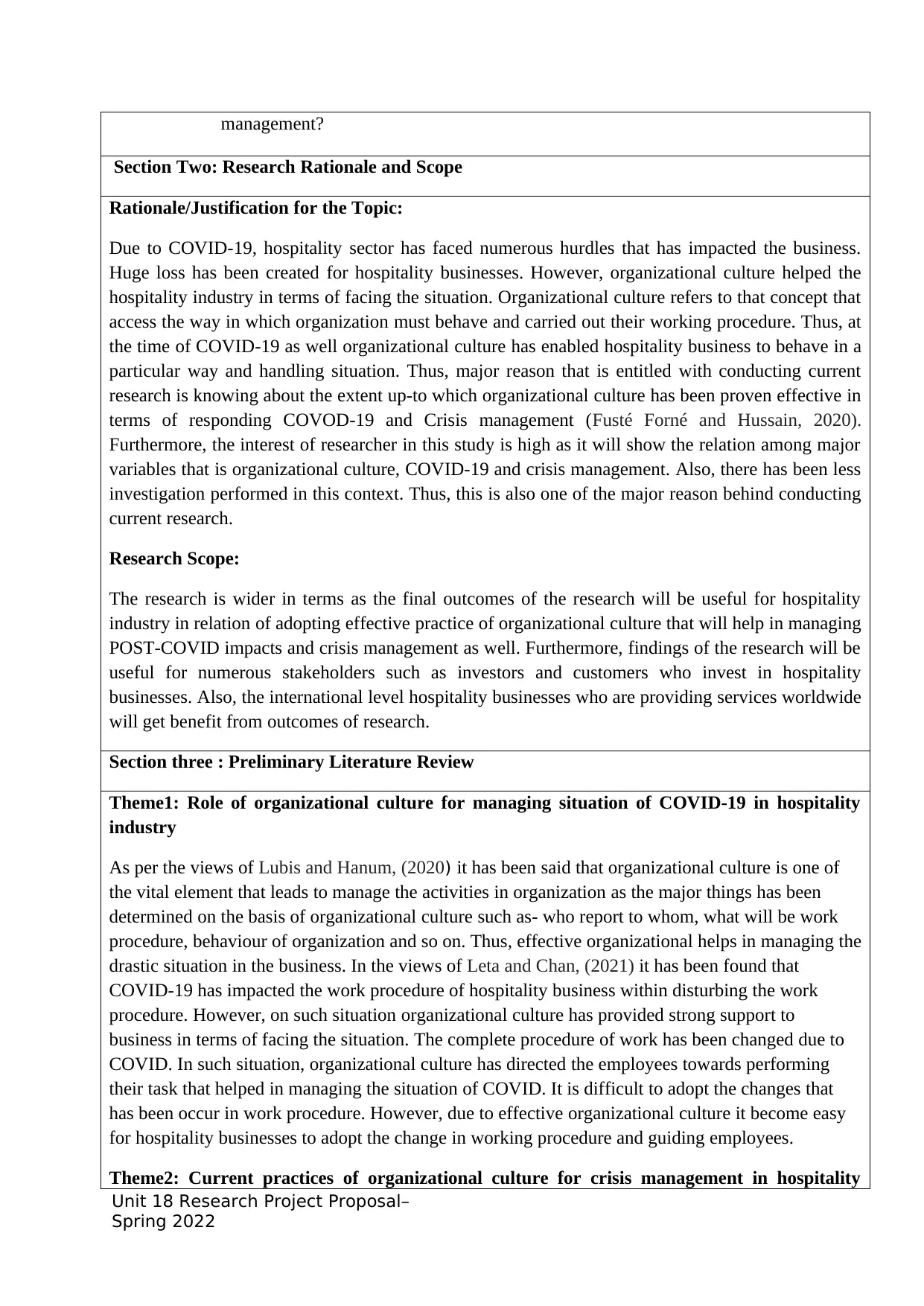
management?
Section Two: Research Rationale and Scope
Rationale/Justification for the Topic:
Due to COVID-19, hospitality sector has faced numerous hurdles that has impacted the business.
Huge loss has been created for hospitality businesses. However, organizational culture helped the
hospitality industry in terms of facing the situation. Organizational culture refers to that concept that
access the way in which organization must behave and carried out their working procedure. Thus, at
the time of COVID-19 as well organizational culture has enabled hospitality business to behave in a
particular way and handling situation. Thus, major reason that is entitled with conducting current
research is knowing about the extent up-to which organizational culture has been proven effective in
terms of responding COVOD-19 and Crisis management (Fusté Forné and Hussain, 2020).
Furthermore, the interest of researcher in this study is high as it will show the relation among major
variables that is organizational culture, COVID-19 and crisis management. Also, there has been less
investigation performed in this context. Thus, this is also one of the major reason behind conducting
current research.
Research Scope:
The research is wider in terms as the final outcomes of the research will be useful for hospitality
industry in relation of adopting effective practice of organizational culture that will help in managing
POST-COVID impacts and crisis management as well. Furthermore, findings of the research will be
useful for numerous stakeholders such as investors and customers who invest in hospitality
businesses. Also, the international level hospitality businesses who are providing services worldwide
will get benefit from outcomes of research.
Section three : Preliminary Literature Review
Theme1: Role of organizational culture for managing situation of COVID-19 in hospitality
industry
As per the views of Lubis and Hanum, (2020) it has been said that organizational culture is one of
the vital element that leads to manage the activities in organization as the major things has been
determined on the basis of organizational culture such as- who report to whom, what will be work
procedure, behaviour of organization and so on. Thus, effective organizational helps in managing the
drastic situation in the business. In the views of Leta and Chan, (2021) it has been found that
COVID-19 has impacted the work procedure of hospitality business within disturbing the work
procedure. However, on such situation organizational culture has provided strong support to
business in terms of facing the situation. The complete procedure of work has been changed due to
COVID. In such situation, organizational culture has directed the employees towards performing
their task that helped in managing the situation of COVID. It is difficult to adopt the changes that
has been occur in work procedure. However, due to effective organizational culture it become easy
for hospitality businesses to adopt the change in working procedure and guiding employees.
Theme2: Current practices of organizational culture for crisis management in hospitality
Unit 18 Research Project Proposal–
Spring 2022
Section Two: Research Rationale and Scope
Rationale/Justification for the Topic:
Due to COVID-19, hospitality sector has faced numerous hurdles that has impacted the business.
Huge loss has been created for hospitality businesses. However, organizational culture helped the
hospitality industry in terms of facing the situation. Organizational culture refers to that concept that
access the way in which organization must behave and carried out their working procedure. Thus, at
the time of COVID-19 as well organizational culture has enabled hospitality business to behave in a
particular way and handling situation. Thus, major reason that is entitled with conducting current
research is knowing about the extent up-to which organizational culture has been proven effective in
terms of responding COVOD-19 and Crisis management (Fusté Forné and Hussain, 2020).
Furthermore, the interest of researcher in this study is high as it will show the relation among major
variables that is organizational culture, COVID-19 and crisis management. Also, there has been less
investigation performed in this context. Thus, this is also one of the major reason behind conducting
current research.
Research Scope:
The research is wider in terms as the final outcomes of the research will be useful for hospitality
industry in relation of adopting effective practice of organizational culture that will help in managing
POST-COVID impacts and crisis management as well. Furthermore, findings of the research will be
useful for numerous stakeholders such as investors and customers who invest in hospitality
businesses. Also, the international level hospitality businesses who are providing services worldwide
will get benefit from outcomes of research.
Section three : Preliminary Literature Review
Theme1: Role of organizational culture for managing situation of COVID-19 in hospitality
industry
As per the views of Lubis and Hanum, (2020) it has been said that organizational culture is one of
the vital element that leads to manage the activities in organization as the major things has been
determined on the basis of organizational culture such as- who report to whom, what will be work
procedure, behaviour of organization and so on. Thus, effective organizational helps in managing the
drastic situation in the business. In the views of Leta and Chan, (2021) it has been found that
COVID-19 has impacted the work procedure of hospitality business within disturbing the work
procedure. However, on such situation organizational culture has provided strong support to
business in terms of facing the situation. The complete procedure of work has been changed due to
COVID. In such situation, organizational culture has directed the employees towards performing
their task that helped in managing the situation of COVID. It is difficult to adopt the changes that
has been occur in work procedure. However, due to effective organizational culture it become easy
for hospitality businesses to adopt the change in working procedure and guiding employees.
Theme2: Current practices of organizational culture for crisis management in hospitality
Unit 18 Research Project Proposal–
Spring 2022
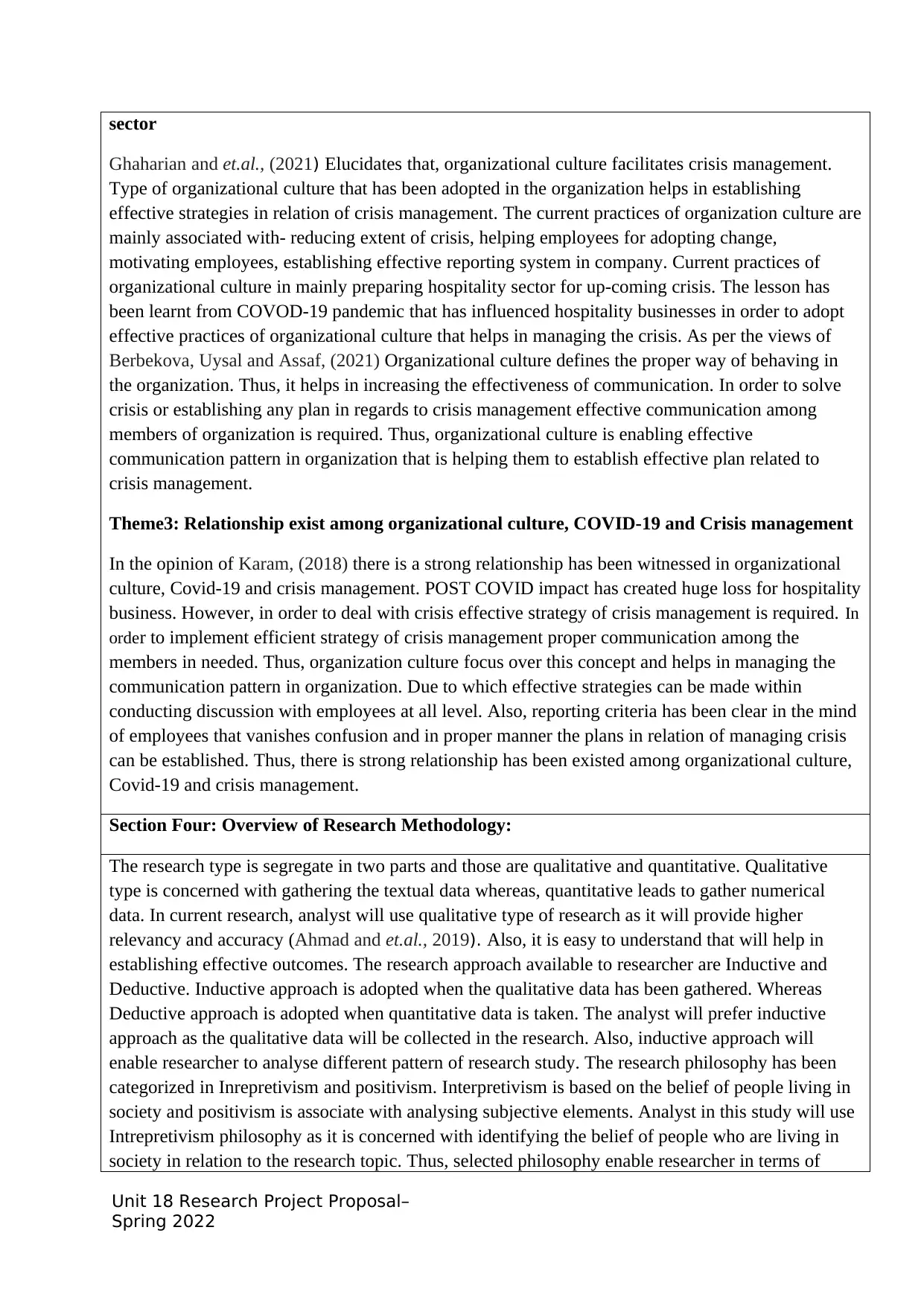
sector
Ghaharian and et.al., (2021) Elucidates that, organizational culture facilitates crisis management.
Type of organizational culture that has been adopted in the organization helps in establishing
effective strategies in relation of crisis management. The current practices of organization culture are
mainly associated with- reducing extent of crisis, helping employees for adopting change,
motivating employees, establishing effective reporting system in company. Current practices of
organizational culture in mainly preparing hospitality sector for up-coming crisis. The lesson has
been learnt from COVOD-19 pandemic that has influenced hospitality businesses in order to adopt
effective practices of organizational culture that helps in managing the crisis. As per the views of
Berbekova, Uysal and Assaf, (2021) Organizational culture defines the proper way of behaving in
the organization. Thus, it helps in increasing the effectiveness of communication. In order to solve
crisis or establishing any plan in regards to crisis management effective communication among
members of organization is required. Thus, organizational culture is enabling effective
communication pattern in organization that is helping them to establish effective plan related to
crisis management.
Theme3: Relationship exist among organizational culture, COVID-19 and Crisis management
In the opinion of Karam, (2018) there is a strong relationship has been witnessed in organizational
culture, Covid-19 and crisis management. POST COVID impact has created huge loss for hospitality
business. However, in order to deal with crisis effective strategy of crisis management is required. In
order to implement efficient strategy of crisis management proper communication among the
members in needed. Thus, organization culture focus over this concept and helps in managing the
communication pattern in organization. Due to which effective strategies can be made within
conducting discussion with employees at all level. Also, reporting criteria has been clear in the mind
of employees that vanishes confusion and in proper manner the plans in relation of managing crisis
can be established. Thus, there is strong relationship has been existed among organizational culture,
Covid-19 and crisis management.
Section Four: Overview of Research Methodology:
The research type is segregate in two parts and those are qualitative and quantitative. Qualitative
type is concerned with gathering the textual data whereas, quantitative leads to gather numerical
data. In current research, analyst will use qualitative type of research as it will provide higher
relevancy and accuracy (Ahmad and et.al., 2019). Also, it is easy to understand that will help in
establishing effective outcomes. The research approach available to researcher are Inductive and
Deductive. Inductive approach is adopted when the qualitative data has been gathered. Whereas
Deductive approach is adopted when quantitative data is taken. The analyst will prefer inductive
approach as the qualitative data will be collected in the research. Also, inductive approach will
enable researcher to analyse different pattern of research study. The research philosophy has been
categorized in Inrepretivism and positivism. Interpretivism is based on the belief of people living in
society and positivism is associate with analysing subjective elements. Analyst in this study will use
Intrepretivism philosophy as it is concerned with identifying the belief of people who are living in
society in relation to the research topic. Thus, selected philosophy enable researcher in terms of
Unit 18 Research Project Proposal–
Spring 2022
Ghaharian and et.al., (2021) Elucidates that, organizational culture facilitates crisis management.
Type of organizational culture that has been adopted in the organization helps in establishing
effective strategies in relation of crisis management. The current practices of organization culture are
mainly associated with- reducing extent of crisis, helping employees for adopting change,
motivating employees, establishing effective reporting system in company. Current practices of
organizational culture in mainly preparing hospitality sector for up-coming crisis. The lesson has
been learnt from COVOD-19 pandemic that has influenced hospitality businesses in order to adopt
effective practices of organizational culture that helps in managing the crisis. As per the views of
Berbekova, Uysal and Assaf, (2021) Organizational culture defines the proper way of behaving in
the organization. Thus, it helps in increasing the effectiveness of communication. In order to solve
crisis or establishing any plan in regards to crisis management effective communication among
members of organization is required. Thus, organizational culture is enabling effective
communication pattern in organization that is helping them to establish effective plan related to
crisis management.
Theme3: Relationship exist among organizational culture, COVID-19 and Crisis management
In the opinion of Karam, (2018) there is a strong relationship has been witnessed in organizational
culture, Covid-19 and crisis management. POST COVID impact has created huge loss for hospitality
business. However, in order to deal with crisis effective strategy of crisis management is required. In
order to implement efficient strategy of crisis management proper communication among the
members in needed. Thus, organization culture focus over this concept and helps in managing the
communication pattern in organization. Due to which effective strategies can be made within
conducting discussion with employees at all level. Also, reporting criteria has been clear in the mind
of employees that vanishes confusion and in proper manner the plans in relation of managing crisis
can be established. Thus, there is strong relationship has been existed among organizational culture,
Covid-19 and crisis management.
Section Four: Overview of Research Methodology:
The research type is segregate in two parts and those are qualitative and quantitative. Qualitative
type is concerned with gathering the textual data whereas, quantitative leads to gather numerical
data. In current research, analyst will use qualitative type of research as it will provide higher
relevancy and accuracy (Ahmad and et.al., 2019). Also, it is easy to understand that will help in
establishing effective outcomes. The research approach available to researcher are Inductive and
Deductive. Inductive approach is adopted when the qualitative data has been gathered. Whereas
Deductive approach is adopted when quantitative data is taken. The analyst will prefer inductive
approach as the qualitative data will be collected in the research. Also, inductive approach will
enable researcher to analyse different pattern of research study. The research philosophy has been
categorized in Inrepretivism and positivism. Interpretivism is based on the belief of people living in
society and positivism is associate with analysing subjective elements. Analyst in this study will use
Intrepretivism philosophy as it is concerned with identifying the belief of people who are living in
society in relation to the research topic. Thus, selected philosophy enable researcher in terms of
Unit 18 Research Project Proposal–
Spring 2022
⊘ This is a preview!⊘
Do you want full access?
Subscribe today to unlock all pages.

Trusted by 1+ million students worldwide
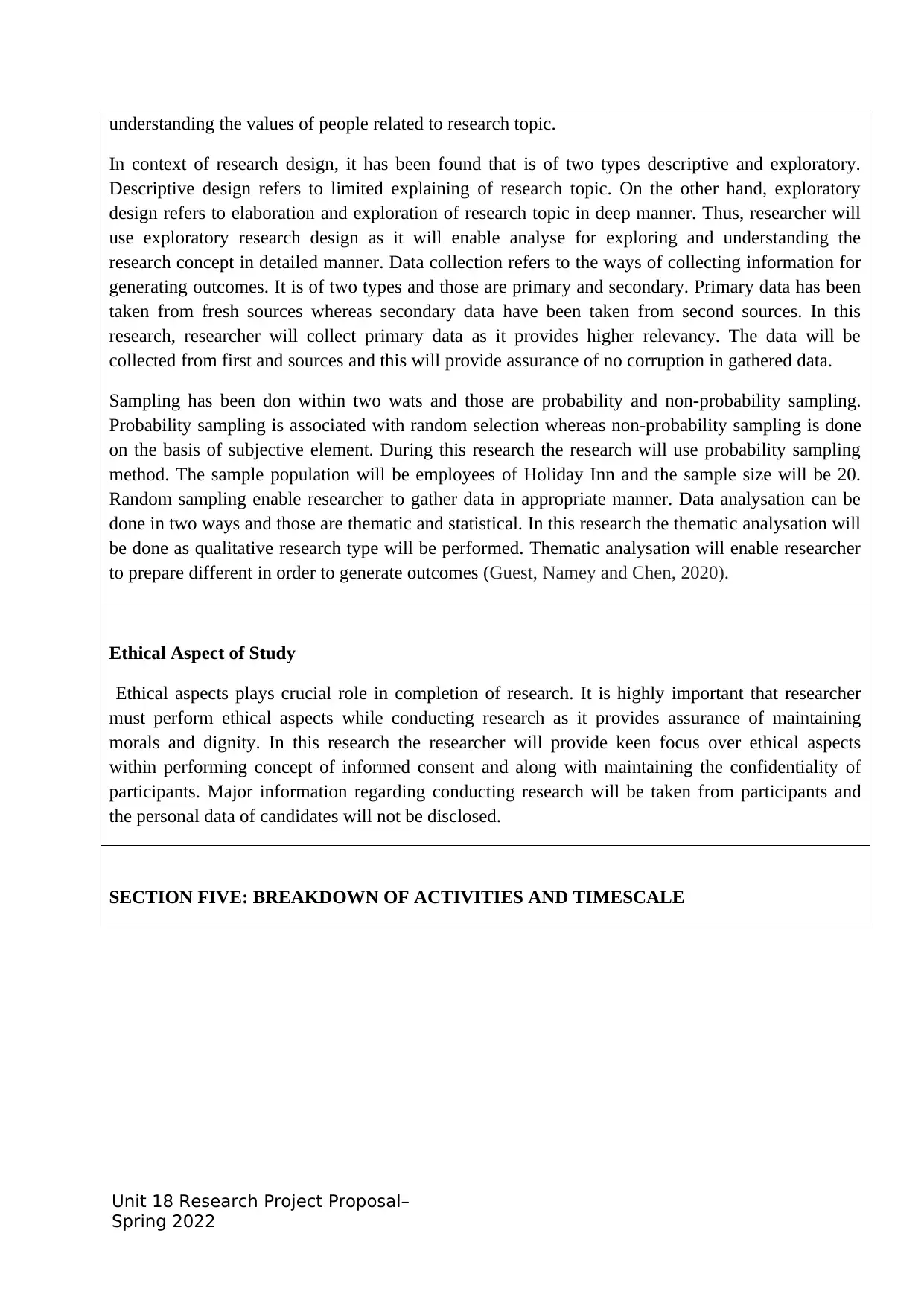
understanding the values of people related to research topic.
In context of research design, it has been found that is of two types descriptive and exploratory.
Descriptive design refers to limited explaining of research topic. On the other hand, exploratory
design refers to elaboration and exploration of research topic in deep manner. Thus, researcher will
use exploratory research design as it will enable analyse for exploring and understanding the
research concept in detailed manner. Data collection refers to the ways of collecting information for
generating outcomes. It is of two types and those are primary and secondary. Primary data has been
taken from fresh sources whereas secondary data have been taken from second sources. In this
research, researcher will collect primary data as it provides higher relevancy. The data will be
collected from first and sources and this will provide assurance of no corruption in gathered data.
Sampling has been don within two wats and those are probability and non-probability sampling.
Probability sampling is associated with random selection whereas non-probability sampling is done
on the basis of subjective element. During this research the research will use probability sampling
method. The sample population will be employees of Holiday Inn and the sample size will be 20.
Random sampling enable researcher to gather data in appropriate manner. Data analysation can be
done in two ways and those are thematic and statistical. In this research the thematic analysation will
be done as qualitative research type will be performed. Thematic analysation will enable researcher
to prepare different in order to generate outcomes (Guest, Namey and Chen, 2020).
Ethical Aspect of Study
Ethical aspects plays crucial role in completion of research. It is highly important that researcher
must perform ethical aspects while conducting research as it provides assurance of maintaining
morals and dignity. In this research the researcher will provide keen focus over ethical aspects
within performing concept of informed consent and along with maintaining the confidentiality of
participants. Major information regarding conducting research will be taken from participants and
the personal data of candidates will not be disclosed.
SECTION FIVE: BREAKDOWN OF ACTIVITIES AND TIMESCALE
Unit 18 Research Project Proposal–
Spring 2022
In context of research design, it has been found that is of two types descriptive and exploratory.
Descriptive design refers to limited explaining of research topic. On the other hand, exploratory
design refers to elaboration and exploration of research topic in deep manner. Thus, researcher will
use exploratory research design as it will enable analyse for exploring and understanding the
research concept in detailed manner. Data collection refers to the ways of collecting information for
generating outcomes. It is of two types and those are primary and secondary. Primary data has been
taken from fresh sources whereas secondary data have been taken from second sources. In this
research, researcher will collect primary data as it provides higher relevancy. The data will be
collected from first and sources and this will provide assurance of no corruption in gathered data.
Sampling has been don within two wats and those are probability and non-probability sampling.
Probability sampling is associated with random selection whereas non-probability sampling is done
on the basis of subjective element. During this research the research will use probability sampling
method. The sample population will be employees of Holiday Inn and the sample size will be 20.
Random sampling enable researcher to gather data in appropriate manner. Data analysation can be
done in two ways and those are thematic and statistical. In this research the thematic analysation will
be done as qualitative research type will be performed. Thematic analysation will enable researcher
to prepare different in order to generate outcomes (Guest, Namey and Chen, 2020).
Ethical Aspect of Study
Ethical aspects plays crucial role in completion of research. It is highly important that researcher
must perform ethical aspects while conducting research as it provides assurance of maintaining
morals and dignity. In this research the researcher will provide keen focus over ethical aspects
within performing concept of informed consent and along with maintaining the confidentiality of
participants. Major information regarding conducting research will be taken from participants and
the personal data of candidates will not be disclosed.
SECTION FIVE: BREAKDOWN OF ACTIVITIES AND TIMESCALE
Unit 18 Research Project Proposal–
Spring 2022
Paraphrase This Document
Need a fresh take? Get an instant paraphrase of this document with our AI Paraphraser
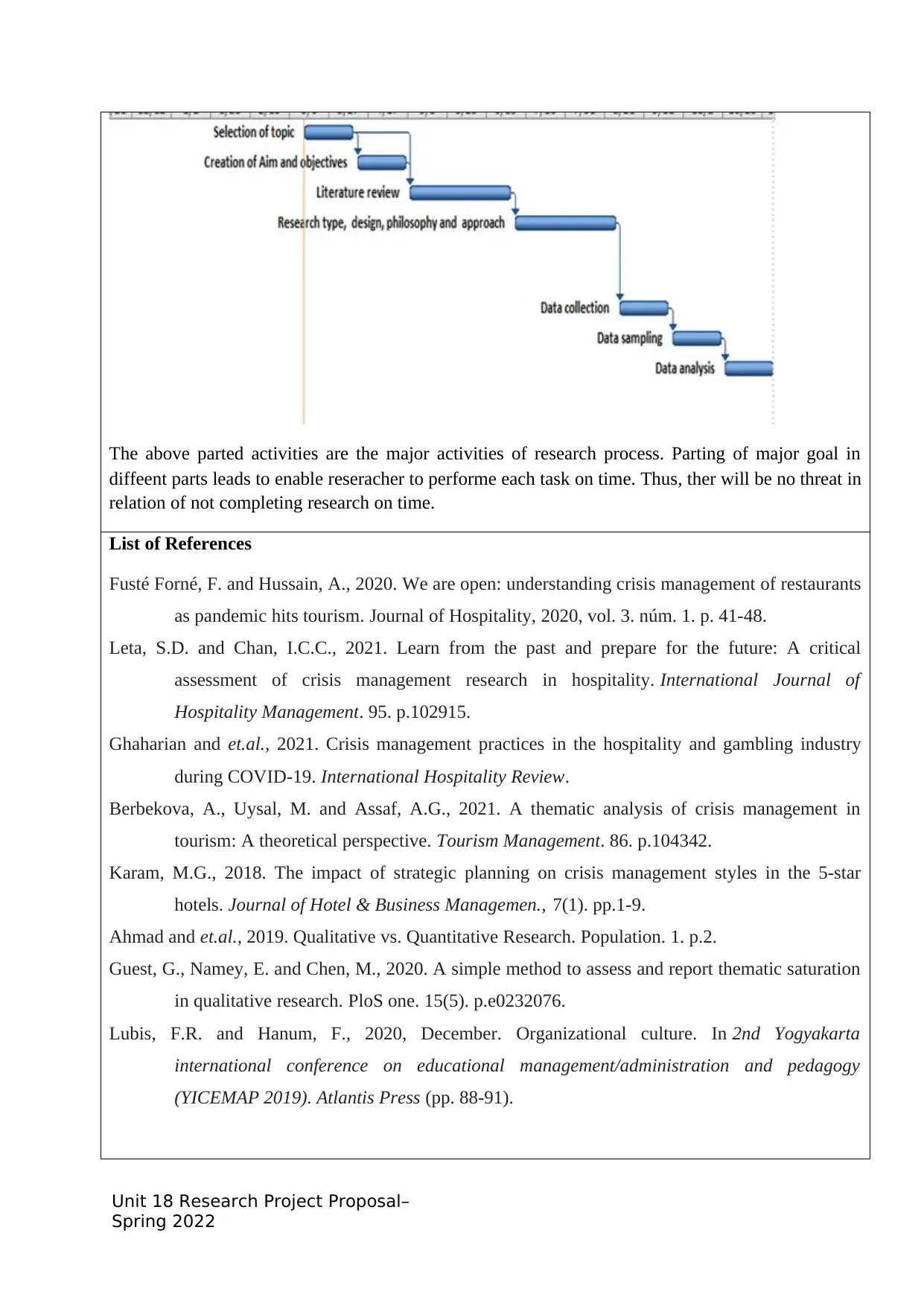
The above parted activities are the major activities of research process. Parting of major goal in
diffeent parts leads to enable reseracher to performe each task on time. Thus, ther will be no threat in
relation of not completing research on time.
List of References
Fusté Forné, F. and Hussain, A., 2020. We are open: understanding crisis management of restaurants
as pandemic hits tourism. Journal of Hospitality, 2020, vol. 3. núm. 1. p. 41-48.
Leta, S.D. and Chan, I.C.C., 2021. Learn from the past and prepare for the future: A critical
assessment of crisis management research in hospitality. International Journal of
Hospitality Management. 95. p.102915.
Ghaharian and et.al., 2021. Crisis management practices in the hospitality and gambling industry
during COVID-19. International Hospitality Review.
Berbekova, A., Uysal, M. and Assaf, A.G., 2021. A thematic analysis of crisis management in
tourism: A theoretical perspective. Tourism Management. 86. p.104342.
Karam, M.G., 2018. The impact of strategic planning on crisis management styles in the 5-star
hotels. Journal of Hotel & Business Managemen., 7(1). pp.1-9.
Ahmad and et.al., 2019. Qualitative vs. Quantitative Research. Population. 1. p.2.
Guest, G., Namey, E. and Chen, M., 2020. A simple method to assess and report thematic saturation
in qualitative research. PloS one. 15(5). p.e0232076.
Lubis, F.R. and Hanum, F., 2020, December. Organizational culture. In 2nd Yogyakarta
international conference on educational management/administration and pedagogy
(YICEMAP 2019). Atlantis Press (pp. 88-91).
Unit 18 Research Project Proposal–
Spring 2022
diffeent parts leads to enable reseracher to performe each task on time. Thus, ther will be no threat in
relation of not completing research on time.
List of References
Fusté Forné, F. and Hussain, A., 2020. We are open: understanding crisis management of restaurants
as pandemic hits tourism. Journal of Hospitality, 2020, vol. 3. núm. 1. p. 41-48.
Leta, S.D. and Chan, I.C.C., 2021. Learn from the past and prepare for the future: A critical
assessment of crisis management research in hospitality. International Journal of
Hospitality Management. 95. p.102915.
Ghaharian and et.al., 2021. Crisis management practices in the hospitality and gambling industry
during COVID-19. International Hospitality Review.
Berbekova, A., Uysal, M. and Assaf, A.G., 2021. A thematic analysis of crisis management in
tourism: A theoretical perspective. Tourism Management. 86. p.104342.
Karam, M.G., 2018. The impact of strategic planning on crisis management styles in the 5-star
hotels. Journal of Hotel & Business Managemen., 7(1). pp.1-9.
Ahmad and et.al., 2019. Qualitative vs. Quantitative Research. Population. 1. p.2.
Guest, G., Namey, E. and Chen, M., 2020. A simple method to assess and report thematic saturation
in qualitative research. PloS one. 15(5). p.e0232076.
Lubis, F.R. and Hanum, F., 2020, December. Organizational culture. In 2nd Yogyakarta
international conference on educational management/administration and pedagogy
(YICEMAP 2019). Atlantis Press (pp. 88-91).
Unit 18 Research Project Proposal–
Spring 2022
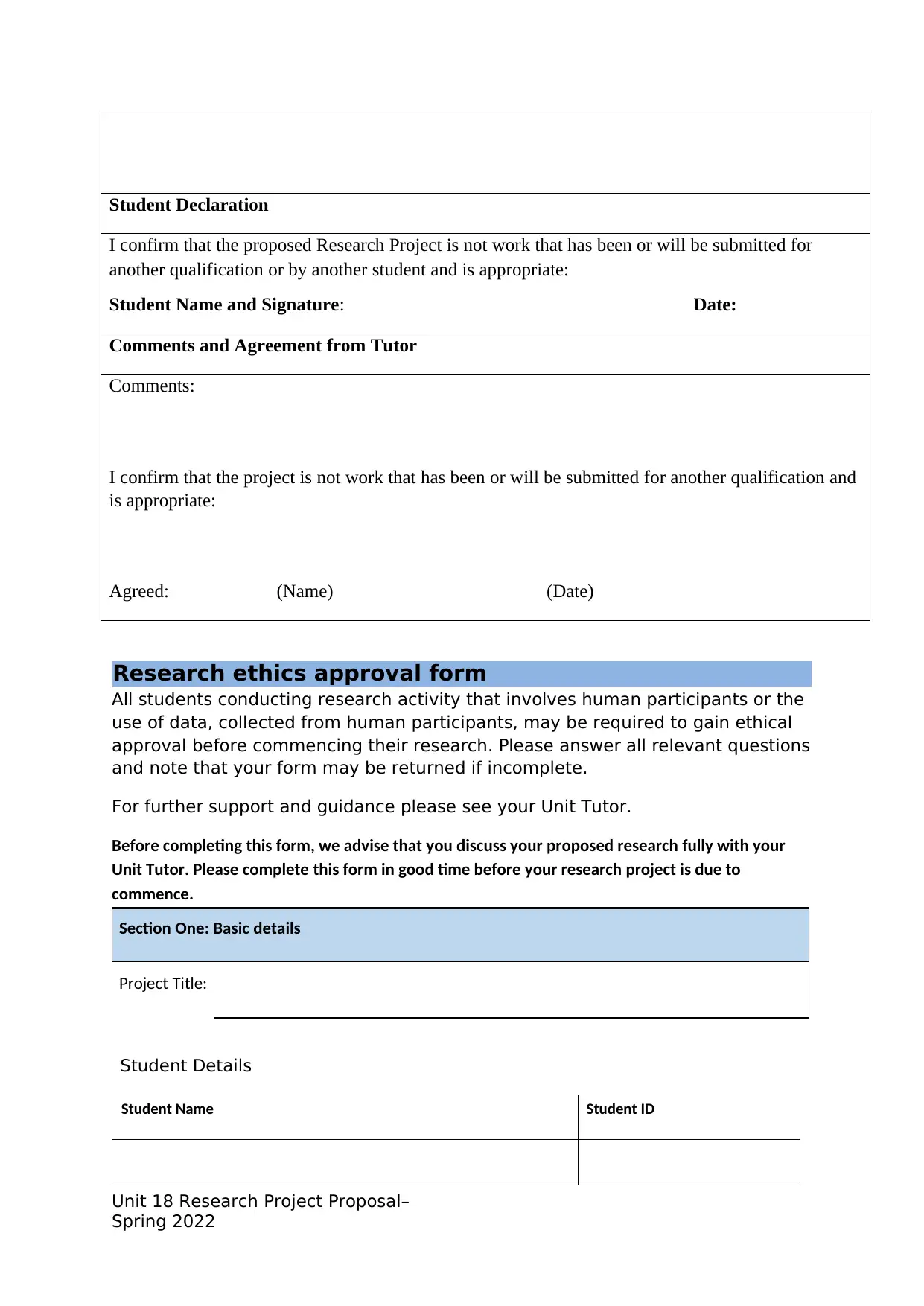
Student Declaration
I confirm that the proposed Research Project is not work that has been or will be submitted for
another qualification or by another student and is appropriate:
Student Name and Signature: Date:
Comments and Agreement from Tutor
Comments:
I confirm that the project is not work that has been or will be submitted for another qualification and
is appropriate:
Agreed: (Name) (Date)
Research ethics approval form
All students conducting research activity that involves human participants or the
use of data, collected from human participants, may be required to gain ethical
approval before commencing their research. Please answer all relevant questions
and note that your form may be returned if incomplete.
For further support and guidance please see your Unit Tutor.
Before completing this form, we advise that you discuss your proposed research fully with your
Unit Tutor. Please complete this form in good time before your research project is due to
commence.
Student Details
Student Name Student ID
Unit 18 Research Project Proposal–
Spring 2022
Section One: Basic details
Project Title:
I confirm that the proposed Research Project is not work that has been or will be submitted for
another qualification or by another student and is appropriate:
Student Name and Signature: Date:
Comments and Agreement from Tutor
Comments:
I confirm that the project is not work that has been or will be submitted for another qualification and
is appropriate:
Agreed: (Name) (Date)
Research ethics approval form
All students conducting research activity that involves human participants or the
use of data, collected from human participants, may be required to gain ethical
approval before commencing their research. Please answer all relevant questions
and note that your form may be returned if incomplete.
For further support and guidance please see your Unit Tutor.
Before completing this form, we advise that you discuss your proposed research fully with your
Unit Tutor. Please complete this form in good time before your research project is due to
commence.
Student Details
Student Name Student ID
Unit 18 Research Project Proposal–
Spring 2022
Section One: Basic details
Project Title:
⊘ This is a preview!⊘
Do you want full access?
Subscribe today to unlock all pages.

Trusted by 1+ million students worldwide
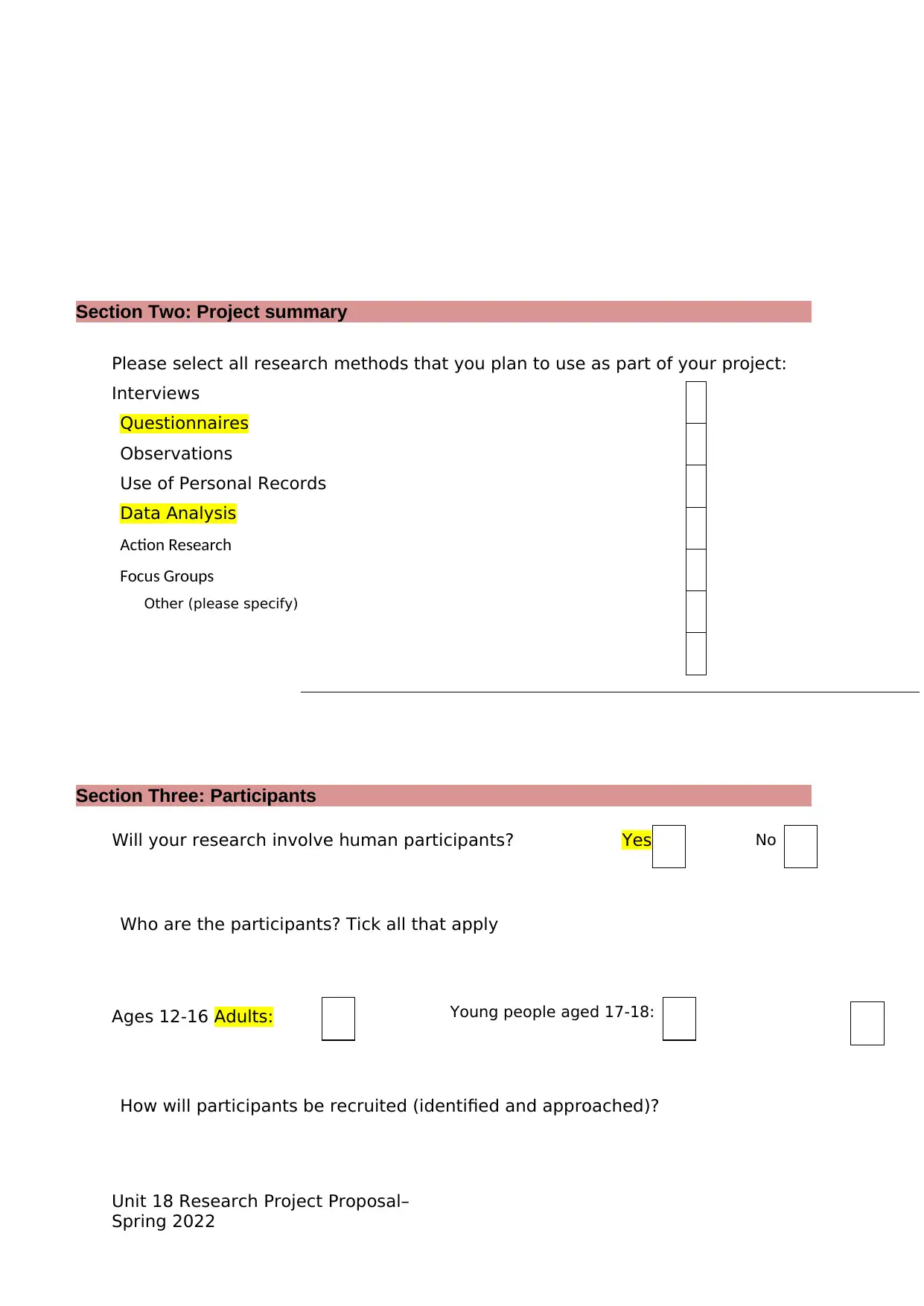
Section Two: Project summary
Please select all research methods that you plan to use as part of your project:
Interviews
Questionnaires
Observations
Use of Personal Records
Data Analysis
Action Research
Focus Groups
Other (please specify)
Section Three: Participants
Will your research involve human participants? Yes
Who are the participants? Tick all that apply
Ages 12-16 Adults:
How will participants be recruited (identified and approached)?
Unit 18 Research Project Proposal–
Spring 2022
No
Young people aged 17-18:
Please select all research methods that you plan to use as part of your project:
Interviews
Questionnaires
Observations
Use of Personal Records
Data Analysis
Action Research
Focus Groups
Other (please specify)
Section Three: Participants
Will your research involve human participants? Yes
Who are the participants? Tick all that apply
Ages 12-16 Adults:
How will participants be recruited (identified and approached)?
Unit 18 Research Project Proposal–
Spring 2022
No
Young people aged 17-18:
Paraphrase This Document
Need a fresh take? Get an instant paraphrase of this document with our AI Paraphraser
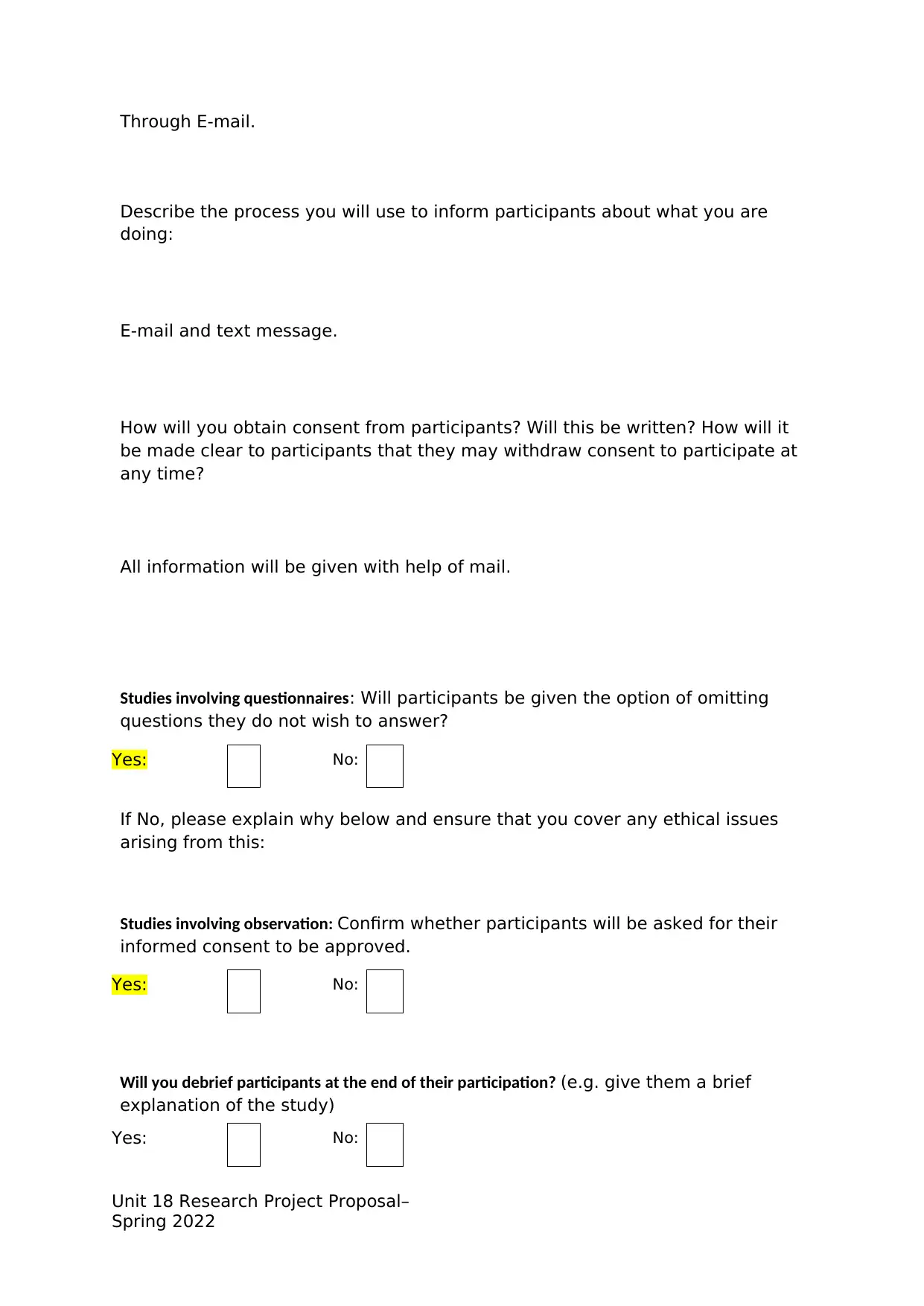
Through E-mail.
Describe the process you will use to inform participants about what you are
doing:
E-mail and text message.
How will you obtain consent from participants? Will this be written? How will it
be made clear to participants that they may withdraw consent to participate at
any time?
All information will be given with help of mail.
Studies involving questionnaires: Will participants be given the option of omitting
questions they do not wish to answer?
Yes:
If No, please explain why below and ensure that you cover any ethical issues
arising from this:
Studies involving observation: Confirm whether participants will be asked for their
informed consent to be approved.
Yes:
Will you debrief participants at the end of their participation? (e.g. give them a brief
explanation of the study)
Yes:
Unit 18 Research Project Proposal–
Spring 2022
No:
No:
No:
Describe the process you will use to inform participants about what you are
doing:
E-mail and text message.
How will you obtain consent from participants? Will this be written? How will it
be made clear to participants that they may withdraw consent to participate at
any time?
All information will be given with help of mail.
Studies involving questionnaires: Will participants be given the option of omitting
questions they do not wish to answer?
Yes:
If No, please explain why below and ensure that you cover any ethical issues
arising from this:
Studies involving observation: Confirm whether participants will be asked for their
informed consent to be approved.
Yes:
Will you debrief participants at the end of their participation? (e.g. give them a brief
explanation of the study)
Yes:
Unit 18 Research Project Proposal–
Spring 2022
No:
No:
No:
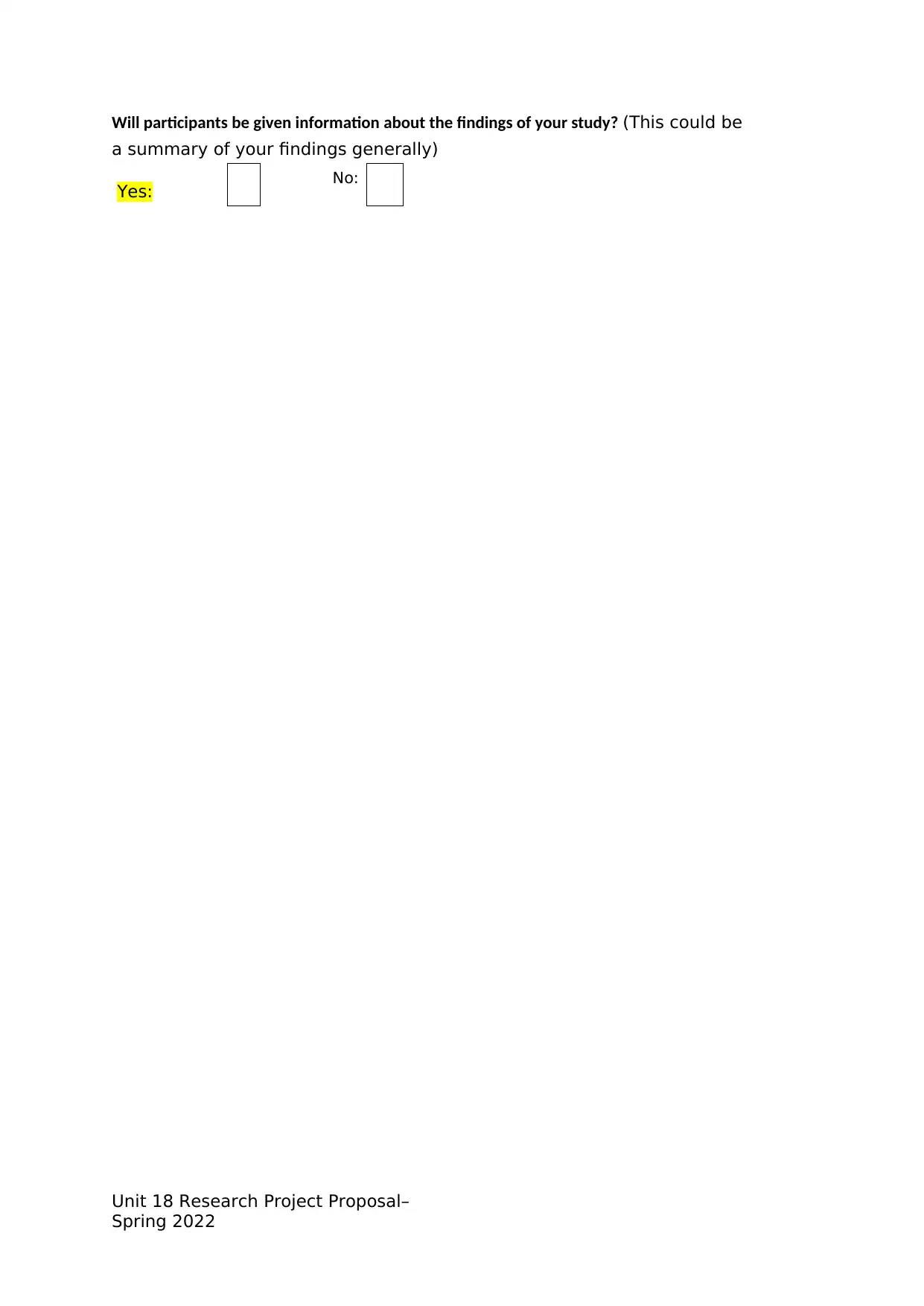
Will participants be given information about the findings of your study? (This could be
a summary of your findings generally)
Yes:
Unit 18 Research Project Proposal–
Spring 2022
No:
a summary of your findings generally)
Yes:
Unit 18 Research Project Proposal–
Spring 2022
No:
⊘ This is a preview!⊘
Do you want full access?
Subscribe today to unlock all pages.

Trusted by 1+ million students worldwide
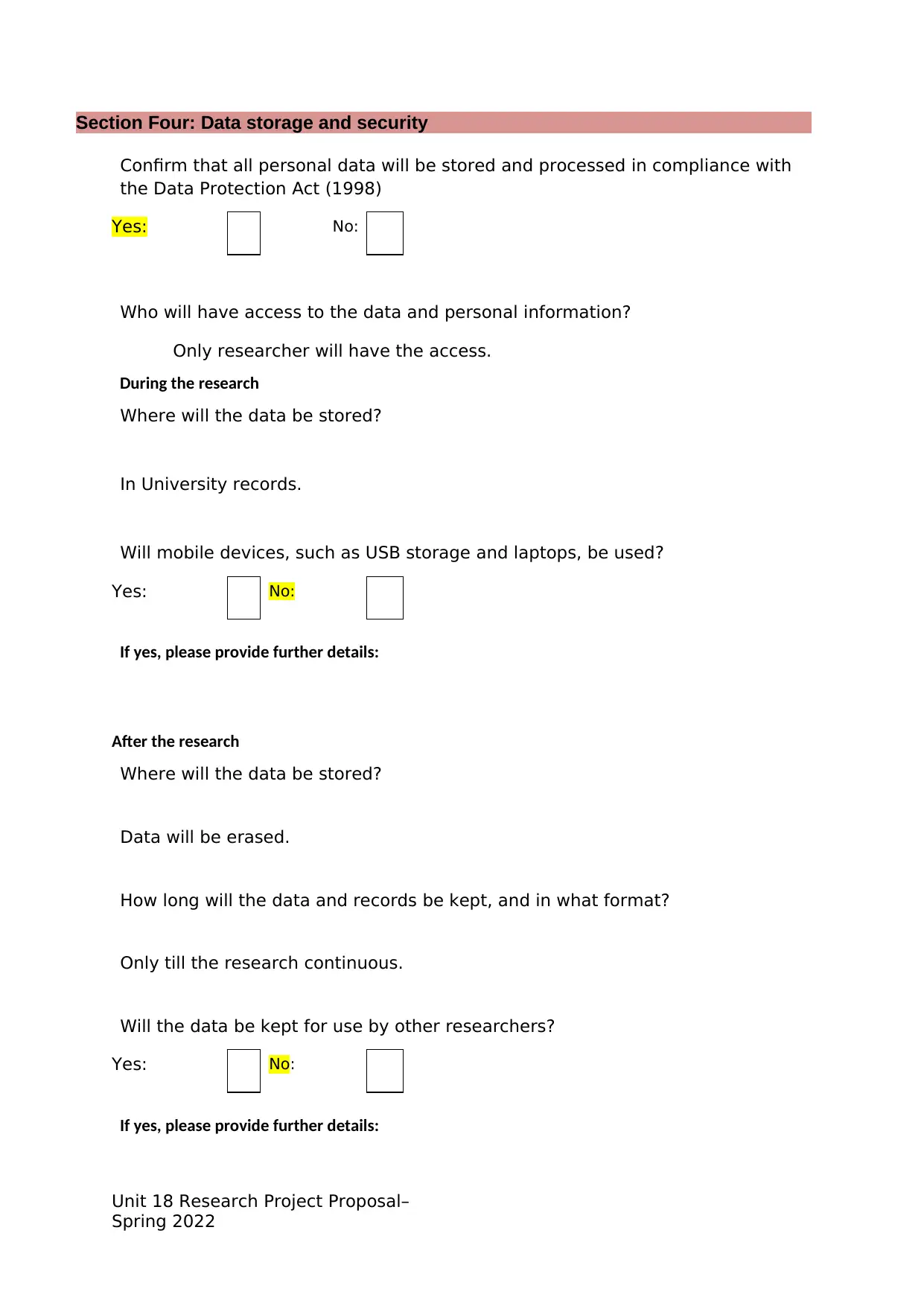
Section Four: Data storage and security
Confirm that all personal data will be stored and processed in compliance with
the Data Protection Act (1998)
Yes:
Who will have access to the data and personal information?
Only researcher will have the access.
During the research
Where will the data be stored?
In University records.
Will mobile devices, such as USB storage and laptops, be used?
Yes:
If yes, please provide further details:
After the research
Where will the data be stored?
Data will be erased.
How long will the data and records be kept, and in what format?
Only till the research continuous.
Will the data be kept for use by other researchers?
Yes:
If yes, please provide further details:
Unit 18 Research Project Proposal–
Spring 2022
No:
No:
No:
Confirm that all personal data will be stored and processed in compliance with
the Data Protection Act (1998)
Yes:
Who will have access to the data and personal information?
Only researcher will have the access.
During the research
Where will the data be stored?
In University records.
Will mobile devices, such as USB storage and laptops, be used?
Yes:
If yes, please provide further details:
After the research
Where will the data be stored?
Data will be erased.
How long will the data and records be kept, and in what format?
Only till the research continuous.
Will the data be kept for use by other researchers?
Yes:
If yes, please provide further details:
Unit 18 Research Project Proposal–
Spring 2022
No:
No:
No:
Paraphrase This Document
Need a fresh take? Get an instant paraphrase of this document with our AI Paraphraser
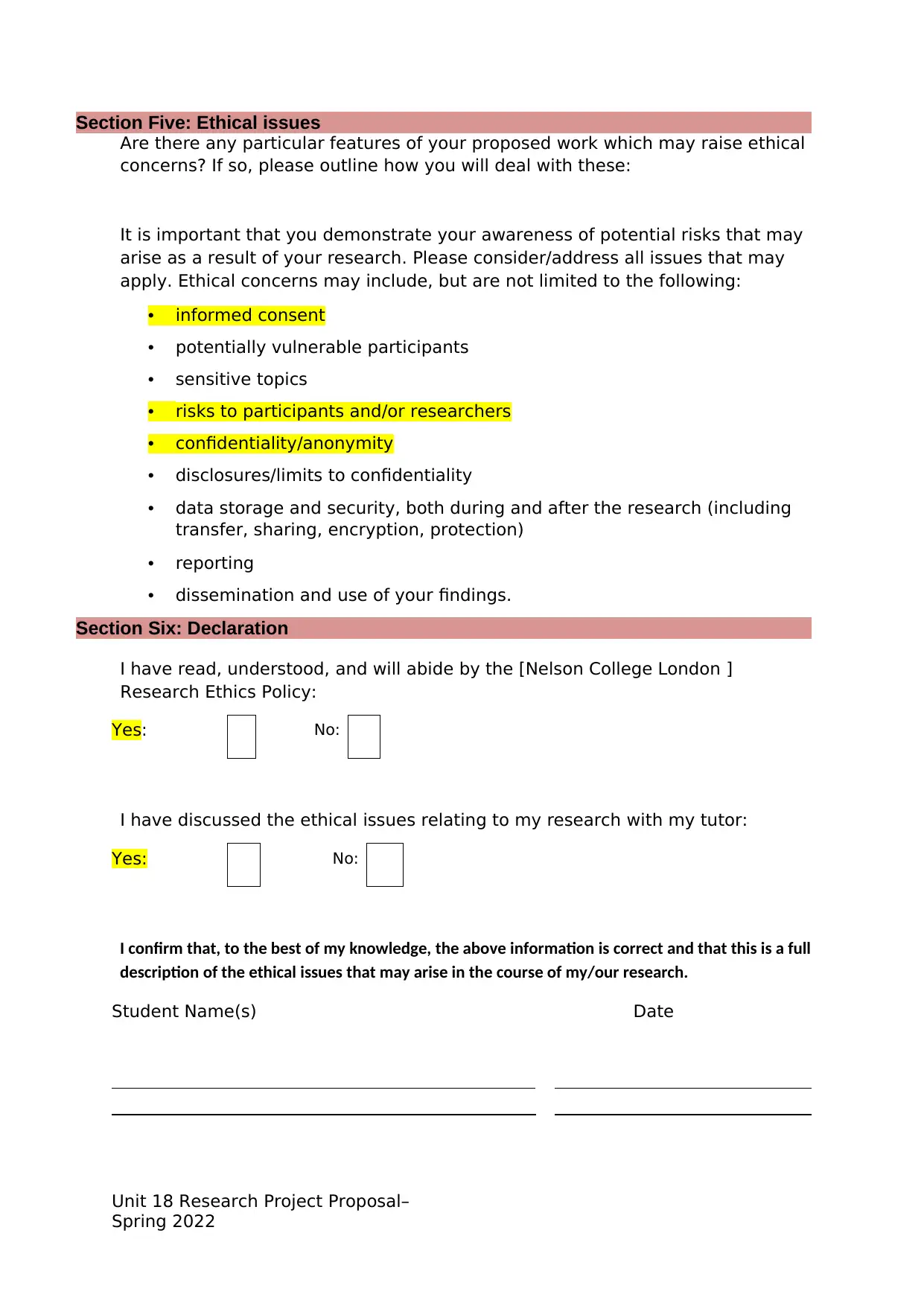
Section Five: Ethical issues
Are there any particular features of your proposed work which may raise ethical
concerns? If so, please outline how you will deal with these:
It is important that you demonstrate your awareness of potential risks that may
arise as a result of your research. Please consider/address all issues that may
apply. Ethical concerns may include, but are not limited to the following:
• informed consent
• potentially vulnerable participants
• sensitive topics
• risks to participants and/or researchers
• confidentiality/anonymity
• disclosures/limits to confidentiality
• data storage and security, both during and after the research (including
transfer, sharing, encryption, protection)
• reporting
• dissemination and use of your findings.
Section Six: Declaration
I have read, understood, and will abide by the [Nelson College London ]
Research Ethics Policy:
Yes:
I have discussed the ethical issues relating to my research with my tutor:
Yes:
I confirm that, to the best of my knowledge, the above information is correct and that this is a full
description of the ethical issues that may arise in the course of my/our research.
Student Name(s) Date
Unit 18 Research Project Proposal–
Spring 2022
No:
No:
Are there any particular features of your proposed work which may raise ethical
concerns? If so, please outline how you will deal with these:
It is important that you demonstrate your awareness of potential risks that may
arise as a result of your research. Please consider/address all issues that may
apply. Ethical concerns may include, but are not limited to the following:
• informed consent
• potentially vulnerable participants
• sensitive topics
• risks to participants and/or researchers
• confidentiality/anonymity
• disclosures/limits to confidentiality
• data storage and security, both during and after the research (including
transfer, sharing, encryption, protection)
• reporting
• dissemination and use of your findings.
Section Six: Declaration
I have read, understood, and will abide by the [Nelson College London ]
Research Ethics Policy:
Yes:
I have discussed the ethical issues relating to my research with my tutor:
Yes:
I confirm that, to the best of my knowledge, the above information is correct and that this is a full
description of the ethical issues that may arise in the course of my/our research.
Student Name(s) Date
Unit 18 Research Project Proposal–
Spring 2022
No:
No:
1 out of 11
Related Documents
Your All-in-One AI-Powered Toolkit for Academic Success.
+13062052269
info@desklib.com
Available 24*7 on WhatsApp / Email
![[object Object]](/_next/static/media/star-bottom.7253800d.svg)
Unlock your academic potential
Copyright © 2020–2026 A2Z Services. All Rights Reserved. Developed and managed by ZUCOL.




